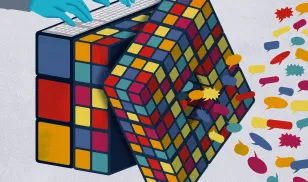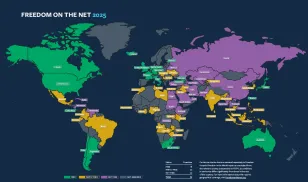

Acknowledgements
Georgian people mobilized in March 2023, including online, against a dangerous bill that would have forced civil society groups to register as “foreign agents” if they received more than 20 percent of their funding from abroad. (Zurab Tsertsvadze/AFP via Getty Images)
Freedom on the Net is a collaborative effort between Freedom House and a network of experts from civil society organizations, academia, journalism, and other backgrounds. For experts working in repressive environments, Freedom House ensures anonymity in order to protect their safety.
Acknowledgements and Sources
Freedom on the Net is a collaborative effort between Freedom House and a network of experts from civil society organizations, academia, journalism, and other backgrounds. For experts working in repressive environments, Freedom House ensures anonymity in order to protect their safety.
The Freedom on the Net team expresses gratitude to the global internet freedom community, including the many individuals and organizations whose tireless and courageous work informs this report.
Freedom on the Net 2025 was made possible by the generous support of the Dutch Ministry of Foreign Affairs, The Dutch Postcode Lottery, Google, Internet Society, Internet Society Foundation, The New York Community Trust, and Proton. This list includes general support and project-specific funding. All US-related research and activities are funded by US-based private donations.
The US State Department’s Bureau of Democracy, Human Rights, and Labor (DRL) provided funding for the project through a multiyear grant that was terminated on March 4, 2025, as part of a broader freeze on US foreign assistance that began in January 2025. Freedom House used alternative funding sources to continue the project.
Freedom House is committed to editorial independence. Our donors have no influence over the content of our publications. All findings and recommendations herein reflect only our own research, judgment, and perspective.
Contributors
Freedom House staff
- Allie Funk, Research Director for Technology and Democracy
- Jennifer Brody, Deputy Director of Policy and Advocacy for Technology and Democracy
- Cathryn Grothe, Senior Research Analyst for Democracy Studies
- Amy Slipowitz, Research Manager, Free Them All: The Fred Hiatt Program to Free Political Prisoners
- Kian Vesteinsson, Senior Research Analyst for Technology and Democracy
- Grant Baker, Research Analyst for Technology and Democracy
Shannon O’Toole and Tyler Roylance edited Freedom on the Net. Gerardo Berthin, Annie Boyajian, Yana Gorokhovskaia, Katie LaRoque, and Adrian Shahbaz provided valuable feedback on the summary of findings. Former Freedom House staff Aashna Agarwal, Matthew Barak, Mina Loldj, Maddie Masinsin, Michael Smeltzer, and Elizabeth Sutterlin were instrumental to the research process.
Independent experts
- Mila Bajić and Bojan Perkov, SHARE Foundation
- Atnafu Brhane Ayalew, independent researcher
- Digital Rights Lab Sudan
- Conor Fitzpatrick, Foundation for Individual Rights and Expression (FIRE)
- Arzu Geybulla, independent researcher
- Katie Harbath, Anchor Change
- Jennifer Huddleston, Cato Institute
- Human Rights Myanmar
- Khalid Ibrahim, Gulf Centre for Human Rights
- Olga Kyryliuk, digital policy and governance strategy
- Rachel Levinson-Waldman, Brennan Center for Justice
- Artur Pericles Lima Monteiro, Yale Law School and Yale Jackson School of Global Affairs
- Lillian Nalwoga, independent researcher
- Bulanda T. Nkhowani, independent researcher
- Gürkan Özturan, European Centre for Press and Media Freedom (ECPMF)
- Smitha Krishna Prasad, Georgetown University Law Center
- Iria Puyosa, Democracy + Tech Initiative, Atlantic Council
- Vladimir Cortés Roshdestvensky, independent researcher
- Southeast Asia Freedom of Expression Network (SAFEnet)
Independent experts from Bangladesh, Georgia, Kyrgyzstan, and Russia wished to remain anonymous.
A Note on Additional Sources and Data
This report’s main essay, data points, and policy recommendations were informed by research for Freedom on the Net’s summaries of country-specific developments, which benefited from the perspectives of the independent experts listed above. Freedom House also extends appreciation to the organizations and individuals who advised on country-specific developments, particularly the Internet Society and its chapters.
Country-specific data can be downloaded at freedomonthenet.org, and each summary of country-specific developments is available at https://freedomhouse.org/countries/freedom-net/scores.
How to Cite this Report
Vesteinsson, Baker, Brody, Funk, Grothe, Slipowitz eds. Freedom on the Net 2025, Freedom House, 2025, www.freedomonthenet.org.
Vesteinsson and Baker, “An Uncertain Future for the Global Internet,” in Vesteinsson, Baker, Brody, Funk, Grothe, Slipowitz eds. Freedom on the Net 2025, Freedom House, 2025, www.freedomonthenet.org.
“Angola,” in Vesteinsson, Baker, Brody, Funk, Grothe, Slipowitz eds. Freedom on the Net 2025, Freedom House, 2025, www.freedomonthenet.org.
Explore the Report

Read the Report
Explore the latest edition of Freedom on the Net.

Key Internet Controls
To track the different ways in which governments seek to dominate the digital sphere, Freedom House monitors their application of nine Key Internet Controls. The resulting data reveal trends in the expansion and diversification of these constraints on internet freedom.

Policy Recommendations
Learn how governments and companies can protect internet freedom.

Sign up to receive the Freedom House weekly newsletter.